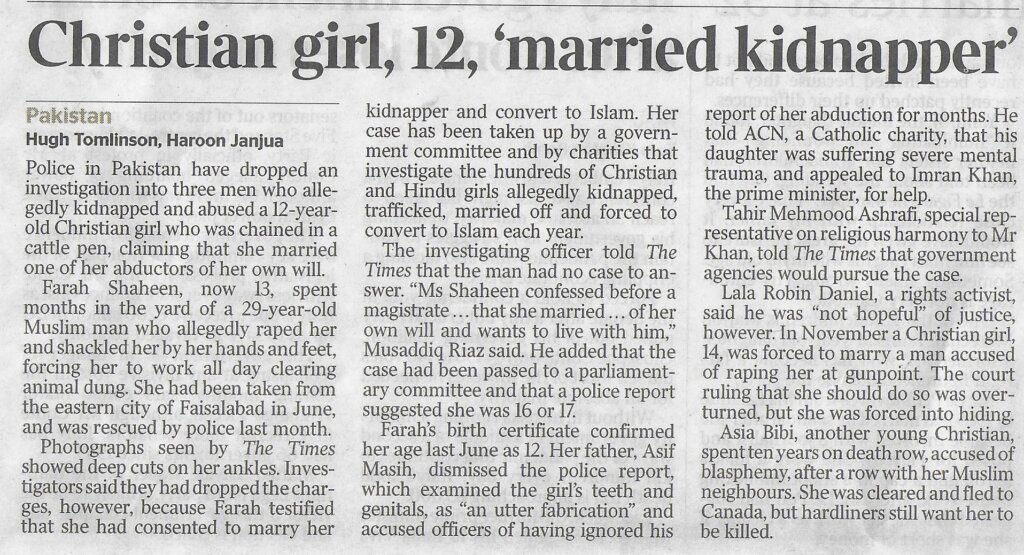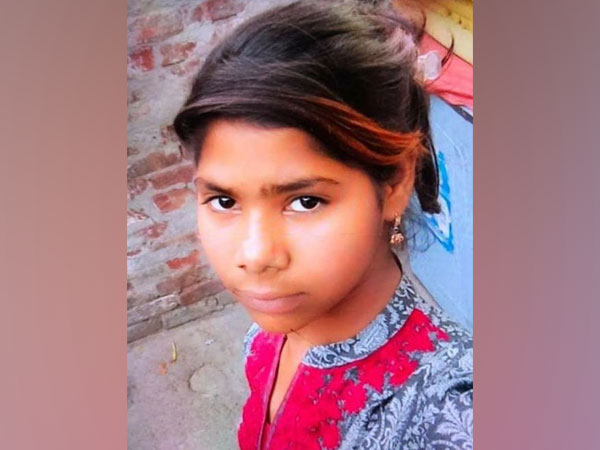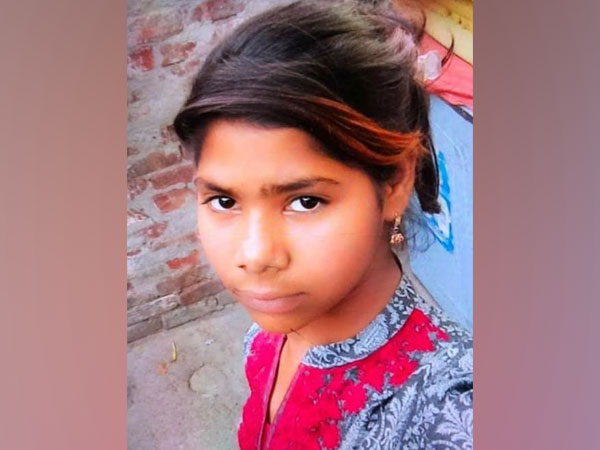
All Party Parliamentary Group Inquiry into Abduction, Forced Marriage, and Forced Conversion of Girls and Young Women in Pakistan: Call for Evidence. Deadline February 15th 2021
This week the Times newspaper reported the case of Farah Shaheen a 12-year-old school girl in Pakistan who was kidnapped, married allegedly raped and converted after being shackled by her hands and feet. She was rescued by police last month, but no charges have been brought against her abductor.
According to unverified reports, about 1,000 girls and women from religious minorities, mainly Christian and Hindus, are abducted, forcibly converted and forcibly married in Pakistan, each year. These reports further suggest that some of the victims are divorced and abandoned after a few years, and others are trafficked for sexual exploitation. The problem is growing and requires an urgent investigation and inquiry.
A number of laws have been enacted in Pakistan to prevent child marriages – for example the Child Marriage Restraint Act 1929 and the Sindh Child Marriage Restraint Act 2014, which raised the legal minimum age of marriage for boys and girls to 18, in Sindh province. But these haven’t been implemented properly especially in the cases of forced conversions of young girls from the minority communities.
Pakistan is a party to several international treaties which impose duties on Pakistan to protect the girls from such abductions, forced conversions and forced marriages. These include the UN Convention on the Rights of the Child, Article 14 of which specifies, “States Parties shall respect the right of the child to freedom of thought, conscience and religion”.
Apart from the laws, the law enforcement system also poses challenges to the families seeking help.
According to reports, the police often either refuse to record a First Information Report (FIR), the first and most important document in the criminal justice system in Pakistan, or record it as a less serious offence which in turn means that the parents, are not able to pursue the cases in courts.
These abductions forced conversions and forced marriages have long-lasting and profound effects not only on the lives of girls, but also on whole communities.
The parents, once they hear of such cases, try to restrict their daughters’ freedom to attend schools.
Sometimes they might also opt for an early marriage, to prevent such abductions, forced conversions and forced marriages.
Early marriage deprives the female of education, economic opportunities, social advancement, and good health. This results in the vicious circle of limited education, early marriage and children, family poverty and the resulting need for children to go to work rather than attend school.
In 2019, after a visit to Pakistan, the APPG for Pakistani Minorities published a report and identified the issue of abductions, forced conversions and forced marriages as one which needed urgent attention, and made several recommendations which could alleviate or seriously reduce this problem.
However, the Government of Pakistan has failed to take any serious initiatives to tackle the problem. Recently, and during the Covid-19 pandemic, the problem has worsened, with an increase in abductions of girls as young as 12-14.
Hence the need for this Inquiry.
Aims of the inquiry
- The aim of the Inquiry will be to:
- to analyse the scope of the issue and to examine whether such abductions, forced conversions and forced marriages are a problem of religious minority girls only, or a problem affecting all girls;
- to map the effects of abductions, forced conversions and forced marriages on the girls (their mental, emotional and physical health), their families and whole communities;
- to examine how this practice affects the victim’s education, future jobs opportunities, social status and their future within their community;
- to identify the weaknesses and limitation in the existing laws;
- to discover the problems with implementation of existing laws in Pakistan which should prohibit or restrict marriages of underage girls;
- to gather legal and other solutions which could be adopted to prevent abductions, forced conversions and forced marriages
- Finally, to make recommendations to the Pakistani government, as well as the UK government, to combat this practice.
What is the timetable for Evidence gathering?
The evidence gathering process will include an open call for written evidence and oral hearings. The written evidence should be sent by 15 February 2021. A panel will also hear oral evidence during February and publish its findings and recommendations in 2021. Evidence will be gathered from relevant stakeholders, including non-governmental organisations, faith and non-faith-based groups, experts, and victims and their families (where safe and appropriate).
Responses should be emailed to [email protected]. The word limit for submissions is 1500 words. The deadline for written submissions to the inquiry is 15 February 2021. Suitable arrangements including anonymity, will be made for those wishing to give oral evidence.
We hope that the Inquiry will not only help the victims like 12 year old Farah Shaheen and others from Pakistan’s minority communities but that it will also help the Government of Pakistan address what it knows is a serious challenge which urgently needs to be addressed.



